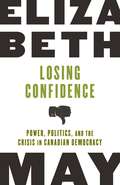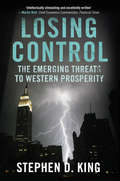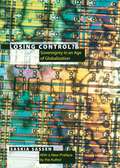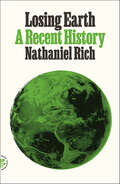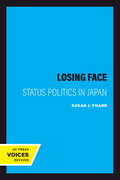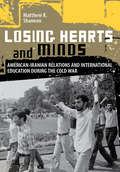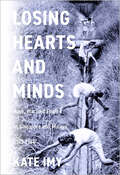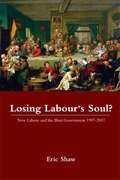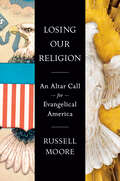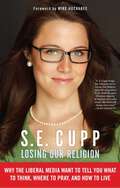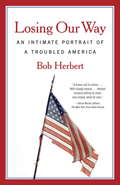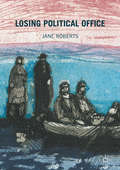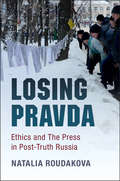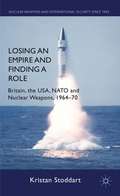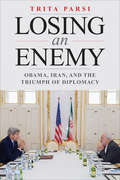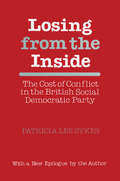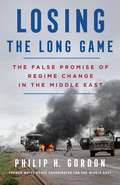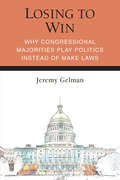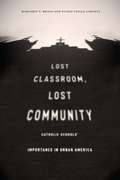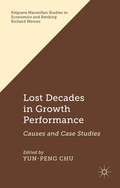- Table View
- List View
Losing Confidence: Power, Politics and the Crisis in Canadian Democracy
by Elizabeth MayA ringing manifesto for change from Canada's Green Party leader and Activist.We Canadians are waking up from our long political slumber to realize that there will not be change unless we insist upon it. We have a presidential-style prime minister without the checks and balances of either the US or the Canadian systems. Attack ads run constantly, backbenchers and cabinet ministers alike are muzzled, committees are deadlocked, and civility has disappeared from the House of Commons. In Losing Confidence, Elizabeth May outlines these and other problems of our political system, and offers inspiring solutions to the dilemmas we face."We no longer behead people in Canada, but Stephen Harper's coup d'état cannot be allowed to stand, not least because of the precedent. Any future government can now slip the leash of democracy in the same way. This is how constitutions fail." - Ronald WrightFrom the Trade Paperback edition.
Losing Control
by Stephen D. KingAs the economic giants of Asia and elsewhere have awakened, Western leaders have increasingly struggled to maintain economic stability. The international financial crisis that began in 2007 is but one result of the emerging nations' increased gravitational pull. In this vividly written and compellingly argued book, Stephen D. King, the global chief economist at HSBC, one of the largest banking groups in the world, suggests that the decades ahead will see a major redistribution of wealth and power across the globe that will force consumers in the United States and Europe to stop living beyond their means. The tide of money washing in from emerging nations has already fuelled the recent property bubble in the West, while new patterns of trade have left the West increasingly dependent on risky financial services. Unless things change drastically, King argues, the increasing power of emerging markets, when coupled with poor internal regulation and an increasingly anachronistic system of global governance, will result in greater instability and income inequality, accompanied by the risk of a major dollar decline. And as Western populations age and emerging economies develop further, the social and political consequences may be alarming to citizens who have grown accustomed to living in prosperity.
Losing Control? Sovereignty in the Age of Globalization
by Saskia SassenExamining the rise of private transnational legal codes and supranational institutions such as the World Trade Organization and universal human rights covenants, Saskia Sassen argues that sovereignty remains an important feature of the international system, but that it is no longer confined to the nation-state.
Losing Control?: Sovereignty in the Age of Globalization (Leonard Hastings Schoff Lectures)
by Saskia SassenWhat determines the flow of labor and capital in this new global information economy? Who has the capacity to coordinate this new system, to create some measure of order? What happens to territoriality and sovereignty, two fundamental principles of the modern state? And who gains rights and who loses rights? Losing Control? examines the rise of private transnational legal codes and supranational institutions, such as the World Trade Organization and universal human rights covenants, and shows that though sovereignty remains an important feature of the international system, it is no longer confined to the nation-state. Other actors gain rights and a kind of sovereignty by setting some of the rules that used to be within the exclusive domain of states. Saskia Sassen tracks the emergence and the making of the transformations that mark our world today, among which is the partial denationalizing of national territory. Two arenas in particular stand out in the new spatial and economic order by their capacity to set their own rules: the global capital market and the series of codes and institutions that have mushroomed into an international human rights regime. As Sassen shows, these two quasi-legal realms now have the power and legitimacy to demand action and accountability from national governments, with the ironic twist that both depend upon the state to enforce their goals. From the economic policy shifts forced by the Mexico debt crisis to the recurring battles over immigration and refugees around the world, Losing Control? incisively analyzes the events that have radically altered the landscape of governance in an era of increasing globalization.
Losing Earth: A Recent History
by Nathaniel RichA Vanity Fair Best Book of the Year: “Gripping . . . revelatory . . . Climate change is a tragedy, but Rich makes clear that it is also a crime.” —The New York Times Book ReviewFinalist, PEN/E.O. Wilson Literary Science Writing AwardBy 1979, we knew nearly everything we understand today about climate change—including how to stop it. Over the next decade, a handful of scientists, politicians, and strategists, led by two unlikely heroes, risked their careers in a desperate, escalating campaign to convince the world to act before it was too late. Losing Earth is their story, and ours.The New York Times Magazine devoted an entire issue to Nathaniel Rich’s groundbreaking chronicle of that decade, which became an instant journalistic phenomenon sparking coverage and conversations around the world. Emphasizing the lives of those who grappled with the great existential threat of our age, it made vivid the moral dimensions of our shared plight.Now expanded into book form, Losing Earth tells the human story of climate change in even richer, more intimate terms. It reveals, in previously unreported detail, the birth of climate denialism and the genesis of the fossil fuel industry’s coordinated effort to thwart climate policy through misinformation, propaganda, and political influence. The book carries the story into the present day, wrestling with the long shadow of our past failures and asking crucial questions about how we make sense of our past, our future, and ourselves.Like John Hersey’s Hiroshima and Jonathan Schell’s The Fate of the Earth, Losing Earth is that rare achievement: a riveting work of dramatic history that articulates a moral framework for understanding how we got here, and how we must go forward.“Absorbing . . . a well-told tale.” —Newsday“How to explain the mess we’re in? Nathaniel Rich recounts how a crucial decade was squandered . . . an important contribution to the record of our heedless age.” —Elizabeth Kolbert, author of The Sixth Extinction
Losing Face: Status Politics in Japan (Philip E. Lilienthal Asian Studies Imprint)
by Susan J. PharrThis title is part of UC Press's Voices Revived program, which commemorates University of California Press’s mission to seek out and cultivate the brightest minds and give them voice, reach, and impact. Drawing on a backlist dating to 1893, Voices Revived makes high-quality, peer-reviewed scholarship accessible once again using print-on-demand technology. This title was originally published in 1990.This title is part of UC Press's Voices Revived program, which commemorates University of California Press’s mission to seek out and cultivate the brightest minds and give them voice, reach, and impact. Drawing on a backlist dating to 1893, Voices Revived</DIV
Losing Hearts and Minds: American-Iranian Relations and International Education during the Cold War
by Matthew K. ShannonMatthew K. Shannon provides readers with a reminder of a brief and congenial phase of the relationship between the United States and Iran. In Losing Hearts and Minds, Shannon tells the story of an influx of Iranian students to American college campuses between 1950 and 1979 that globalized U.S. institutions of higher education and produced alliances between Iranian youths and progressive Americans. Losing Hearts and Minds is a narrative rife with historical ironies. Because of its superpower competition with the USSR, the U.S. government worked with nongovernmental organizations to create the means for Iranians to train and study in the United States. The stated goal of this initiative was to establish a cultural foundation for the official relationship and to provide Shah Mohammad Reza Pahlavi with educated elites to administer an ambitious program of socioeconomic development. Despite these goals, Shannon locates the incubation of at least one possible version of the Iranian Revolution on American college campuses, which provided a space for a large and vocal community of dissident Iranian students to organize against the Pahlavi regime and earn the support of empathetic Americans. Together they rejected the Shah’s authoritarian model of development and called for civil and political rights in Iran, giving unwitting support to the rise of the Islamic Republic of Iran.
Losing Hearts and Minds: Race, War, and Empire in Singapore and Malaya, 1915–1960 (Stanford British Histories)
by Kate ImyLosing Hearts and Minds explores the loss of British power and prestige in colonial Singapore and Malaya from the First World War to the Malayan Emergency. During this period, British leaders relied on a growing number of Asian, European and Eurasian allies and servicepeople, including servants, police, soldiers, and medical professionals, to maintain their empire. At the same time, British institutions and leaders continued to use racial and gender violence to wage war. As a result, those colonial subjects closest to British power frequently experienced the limits of belonging and the broken promises of imperial inclusion, hastening the end of British rule in Southeast Asia. From the World Wars to the Cold War, European, Indigenous, Chinese, Malay, and Indian civilians resisted or collaborated with British and Commonwealth soldiers, rebellious Indian troops, invading Japanese combatants, and communists. Historian Kate Imy tells the story of how Singapore and Malaya became sites of some of the most impactful military and anti-colonial conflicts of the twentieth century, where British military leaders repeatedly tried—but largely failed—to win the "hearts and minds" of colonial subjects.
Losing Labour's Soul?: New Labour and the Blair Government 1997-2007
by Eric ShawBased on extensive original research and interviews with a wide variety of key players, this is a compelling assessment of the Labour Party in power. Beginning with a detailed account of the development of New Labour, including the ideological tensions within the party, Eric Shaw provides a sophisticated analysis of the Labour Government during an unprecedented period of power. Offering the most detailed examination yet published of the actual performance of the party in several key social and economic policy areas, Losing Labour’s Soul? will be of enormous interest to students of British politics, labour history and party politics.
Losing Our Religion: An Altar Call for Evangelical America
by Russell MooreFormer Southern Baptist pastor and Christianity Today editor-in-chief Russell Moore calls for repentance and renewal in American evangelicalismAmerican evangelical Christianity has lost its way. While the witness of the church before a watching world is diminished beyond recognition, congregations are torn apart over Donald Trump, Christian nationalism, racial injustice, sexual predation, disgraced leaders, and covered-up scandals. Left behind are millions of believers who counted on the church to be a place of belonging and hope. As greater and greater numbers of younger Americans bleed out from the church, even the most rooted evangelicals are wondering, &“Can American Christianity survive?&”In Losing Our Religion, Russell Moore calls his fellow evangelical Christians to conversion over culture wars, to truth over tribalism, to the gospel over politics, to integrity over influence, and to renewal over nostalgia. With both prophetic honesty and pastoral love, Moore offers a word of counsel for how a new generation of disillusioned and exhausted believers can find a path forward after the crisis and confusion of the last several years. Believing the gospel is too important to leave it to hucksters and grifters, he shows how a Christian can avoid both cynicism and complicity in order to imagine a different, hopeful vision for the church.The altar call of the old evangelical revivals was both a call to repentance and the offer of a new start. In the same way, this book invites unmoored and discouraged Christians to step out into an uncertain future, first by letting go of the kind of cultural, politicized, status quo Christianity that led us to this moment of reckoning. Only when we see how lost we are, we can find our way again. Only when we bury what&’s dead can we experience life again. Only when we lose our religion can we be amazed by grace again.
Losing Our Religion: The Liberal Media's Attack on Christianity
by S. E. Cupp"The press has become a tool of oppression—politicized, self–aware, self–motivated, and power–hungry. . . . In short, these people can no longer be trusted." —From S. E. Cupp’s Losing Our Religion It’s time to wake up and smell the bias. The go-to commentator for such programs as Fox News’s Hannity and CNN’s Larry King Live and Reliable Sources, S. E. Cupp is just that—a reliable source for the latest news, trends, and forecasts in young, bright, conservative America. Savvy and outspoken when shattering left-leaning assumptions as she did in Why You’re Wrong About the Right, Cupp now takes on the most pressing threat to the values and beliefs held and practiced by the majority of Americans: the marginalizing of Christianity by the flagrantly biased liberal media. From her galvanizing introduction, you know where S. E. Cupp stands: She’s an atheist. A non-believer. Which makes her the perfect impartial reporter from the trenches of a culture war dividing America and eroding the Judeo-Christian values on which this country was founded. Starting at the top, she exposes the unwitting courtship of President Obama and the liberal press, which consistently misreports or downplays Obama’s clear discomfort with, or blatant disregard for, religious America—from covering up religious imagery in the backdrop of his Georgetown University speech to his absence from events surrounding the National Day of Prayer, to identifying America in his inaugural address as, among other things, "a nation of non-believers." She likens the calculated attacks of the liberal media to a class war, a revolution with a singular purpose: to overthrow God and silence Christian America for good. And she sends out an urgent call for all Americans to push back the leftist propaganda blitz striking on the Internet, radio, television, in films, publishing, and print journalism—or invite the tyrannies of a "mainstream" media set on mocking our beliefs, controlling our decisions, and extinguishing our freedoms. Now, discover the truth behind the war against Christmas—and how political correctness keeps the faithful under wraps . . . the one-sided analyses of Prop 8 and the gay marriage debate . . . the media pot-shots at Sarah Palin’s personal faith . . . the politicization of entertainment mainstays such as American Idol and the Miss USA Pageant . . . and much more. Also included are her penetrating interviews with Dinesh D’Souza, Martha Zoller, James T. Harris, Newt Gingrich, Kevin Madden, and Kevin Williamson of National Review, delivering must-read analyses of the latest stunning lowlights from the liberal media.
Losing Our Voice: Radio-Canada Under Siege
by Alain Saulnier Pauline CoutureThe inside story of decades of government interference in the work of our national public broadcaster, CBC/Radio-Canada. Is there a quiet campaign to hamstring and silence the CBC? In Losing Our Voice Alain Saulnier, long-time head of news and public affairs at Radio-Canada, documents the decades of political interference that have jeopardized the very existence of one of Canada’s most important cultural institutions. For French-speaking Canadians, with limited options in their own language, the national broadcaster is all the more important. But tensions surrounding national unity and identity have exacerbated the tendency of federal politicians to meddle in CBC/Radio-Canada’s content and management. Saulnier takes us behind the scenes as these tensions play out, and culminate in the punitive Harper budget cuts.
Losing Our Way
by Bob HerbertFrom longtime New York Times columnist Bob Herbert comes a wrenching portrayal of ordinary Americans struggling for survival in a nation that has lost its wayIn his eighteen years as an opinion columnist for The New York Times, Herbert championed the working poor and the middle class. After filing his last column in 2011, he set off on a journey across the country to report on Americans who were being left behind in an economy that has never fully recovered from the Great Recession. The portraits of those he encountered fuel his new book, Losing Our Way. Herbert's combination of heartrending reporting and keen political analysis is the purest expression since the Occupy movement of the plight of the 99 percent. The individuals and families who are paying the price of America's bad choices in recent decades form the book's emotional center: an exhausted high school student in Brooklyn who works the overnight shift in a factory at minimum wage to help pay her family's rent; a twenty-four-year-old soldier from Peachtree City, Georgia, who loses both legs in a misguided, mismanaged, seemingly endless war; a young woman, only recently engaged, who suffers devastating injuries in a tragic bridge collapse in Minneapolis; and a group of parents in Pittsburgh who courageously fight back against the politicians who decimated funding for their children's schools. Herbert reminds us of a time in America when unemployment was low, wages and profits were high, and the nation's wealth, by current standards, was distributed much more equitably. Today, the gap between the wealthy and everyone else has widened dramatically, the nation's physical plant is crumbling, and the inability to find decent work is a plague on a generation. Herbert traces where we went wrong and spotlights the drastic and dangerous shift of political power from ordinary Americans to the corporate and financial elite. Hope for America, he argues, lies in a concerted push to redress that political imbalance. Searing and unforgettable, Losing Our Way ultimately inspires with its faith in ordinary citizens to take back their true political power and reclaim the American dream.From the Hardcover edition.
Losing Political Office
by Jane RobertsBased on in-depth interviews conducted with British politicians, this book analyses the different impacts of leaving political office. Representative democracy depends on politicians exiting office, and yet while there is considerable interest in who stands for and gains office, there is curiously little discussed about this process. Jane Roberts seeks to address this gap by asking: What is the experience like? What happens to politicians as they make the transition from office? What is the impact on their partners and family? Does it matter to anyone other than those immediately affected? Are there any wider implications for our democratic system? This book will appeal to academics in the fields of leadership, political science, public management and administration and psychology. It will also be of interest to elected politicians in central, devolved and local government (current and former), policy makers and political commentators, and more widely, the interested general reader.
Losing Pravda: Ethics and The Press in Post-Truth Russia
by Natalia RoudakovaWhat happens when journalism is made superfluous? Combining ethnography, media analysis, moral and political theory this book examines the unravelling of professional journalism in Russia over the past twenty-five years, and its effects on society. It argues that, contrary to widespread assumptions, late Soviet-era journalists shared a cultural contract with their audiences, which ensured that their work was guided by a truth-telling ethic. Post-communist economic and political upheaval led not so much to greater press freedom as to the de-professionalization of journalism, as journalists found themselves having to monetize their truth-seeking skills. This has culminated in a perception of journalists as political prostitutes, or members of the 'second oldest profession', as they are commonly termed in Russia. Roudakova argues that this cultural shift has fundamentally eroded the value of truth-seeking and telling in Russian society.
Losing an Empire and Finding a Role
by Kristan StoddartThis book sheds fresh light on developments in British nuclear weapons policy between October 1964, when the Labour Party came back into power under Harold Wilson following a thirteen year absence, and June 1970 when the Conservative government of Edward Heath was elected.
Losing an Enemy: Obama, Iran, and the Triumph of Diplomacy
by Trita ParsiThe definitive book on President Obama&’s historic nuclear deal with Iran from the U.S. foreign policy expert and acclaimed author of Treacherous Alliance. In Losing an Enemy, Middle East policy expert Trita Parsi examines President Obama&’s strategy toward Iran&’s nuclear program and reveals how the historic agreement of 2015 broke the persistent stalemate in negotiations that had blocked earlier efforts. The Joint Comprehensive Plan of Action, commonly known as the Iran nuclear deal, accomplished two major feats in one stroke: it averted the threat of war with Iran and prevented the possibility of an Iranian nuclear bomb. Parsi advised the Obama White House throughout the talks and had access to decision-makers and diplomats on the U.S. and Iranian sides alike. With his unique insight, he examines every facet of a triumph that could become as important and consequential as Nixon&’s rapprochement with China. Drawing from more than seventy-five in-depth interviews with key decision-makers, including Iran's Foreign Minister Javad Zarif and U.S. Secretary of State John Kerry, this is the first authoritative account of President Obama&’s signature foreign policy achievement. "A detailed and gripping account of the 22 months of negotiations over Iran&’s nuclear program that resulted in the 2015 deal."—John Waterbury, Foreign Affairs
Losing from the Inside: Cost of Conflict in the British Social Democratic Party
by Patricia Lee SykesThis book focuses on the consequences of internal conflict for electoral competition and demonstrates why the Social Democratic Party (SDP), in alliance with the Liberals, "lost from the inside" during two general election campaigns in Great Britain.
Losing is Democratic: How to Talk to Kids About January 6th (The Fina Mendoza Mysteries)
by Kitty FeldeTeachers, Librarians, Homeschoolers: enhance your comprehensive civics education resources with supplemental curriculum materials. Ten-year-old Fina Mendoza takes readers behind-the-scenes on Capitol Hill as she learns about American democracy, the electoral process, the U.S. legislative branch, and the events of January 6, 2021. Losing is Democratic: How to Talk to Kids About January 6th features a Latina protagonist of spunk and smarts whose congressman father is on the House floor on January 6th. Fina Mendoza, our amateur detective, is in the middle of an investigation to find out who stole the 5th grade's pizza. But all thoughts of detection go out the window as she, her older sister Gabby, and grandmother Abuelita watch on television as a mob breaks into the Capitol. Is Papa okay? Most of Fina's classmates have parents who work inside that building as well. Their teacher calms their fears and the next day, turns the event into a teaching opportunity, looking back at the bitter presidential election rivalry between Thomas Jefferson and John Adams. The students discuss the importance of winning and losing, whether it's in a baseball game, a reading competition, or an election. FREE DOWNLOADABLE CURRICULUM AVAILABLE: Build reading skills while teaching integrated lessons in ELA, social studies, and history designed for grades 3-5 Common Core Standards, NCSS curriculum standards, C3 Social Studies Readiness, and California Public Schools' History-Social Science content standards. Promote deeper learning through active engagement, reading comprehension, content knowledge, and creative and analytical thinking. Designed for use by elementary school teachers, parents, homeschoolers, and community educators. Non-political presentation of the events of January 6th, appropriate for elementary age students. INTERACTIVE COMPONENTS AND MULTIMEDIA SOURCES: Helps address students' diverse learning needs and supports the use of technology in the classroom. The Fina Mendoza Mysteries FREE podcast is based on the books and current events. The "January 6th: Losing is Democratic" 2-part episode is the basis for the book, Losing is Democratic. The "Facts Behind the Fiction" blog offers historical context for both the books and podcast. Introduce civics to your students with The Fina Mendoza Mysteries series.THE FINA MENDOZA MYSTERIES SERIES: Book 1 – Welcome to Washington Fina Mendoza Book 2 – State of the Union: A Fina Mendoza Mystery Book 3 – Snake in the Grass (coming Fall 2024) ALSO AVAILABLE IN SPANISH: Book 1 – Bienvenida a Washington Fina Mendoza Book 2 – Estado de la UniÓn (coming Summer 2024) Book 3 – Serpiente en la Hierba (coming Spring 2025) THE WEST WING MEETS NANCY DREW... For fans of The Secret Lake, Greenglass House, The Mysterious Benedict Society and The National Park Mystery Series as well as classic children's detective series like Boxcar Children, Encyclopedia Brown, and Hardy Boys.
Losing is Democratic: How to Talk to Kids About January 6th (The Fina Mendoza Mysteries)
by Kitty FeldeA great book and series for CIVICS EDUCATION!Losing is Democratic: How to Talk to Kids About January 6th features a Latina protagonist of spunk and smarts whose congressman father is on the House floor on January 6th.Teachers, Librarians, and Homeschoolers, THE FINA MENDOZA MYSTERIES SERIES of Books, Podcasts, Teacher' s Guides, and "Facts Behind the Fiction" newsletter/blog provide a multidisciplinary approach to civics education for elementary school readers. As our amateur detective solves mysteries on Capitol Hill, she and your students learn about American democracy, the electoral process, civic engagement and the events of January 6, 2021.SYNOPSIS: Fina is in the middle of an investigation to find out who stole the 5th grade's pizza— the prize for winning a reading competition. But all thoughts of detection go out the window as she, her older sister Gabby, and grandmother Abuelita watch on television as a mob breaks into the Capitol. Is Papa okay? Most of Fina's classmates have parents who work inside that building as well. Their teacher calms their fears and the next day, turns the event into a teaching opportunity, looking back at the bitter presidential election rivalry between Thomas Jefferson and John Adams. The students discuss the importance of winning and losing, whether it's in a baseball game, a reading competition, or an election.THE WEST WING meets NANCY DREWFREE DOWNLOADABLE CURRICULUM AVAILABLE:Build reading skills while teaching integrated lessons in:– ELA, social studies, and history designed for grades 3-5 Common Core Standards– NCSS curriculum standards, C3 Social Studies Readiness– California Public Schools' History-Social Science content standardsPromote deeper learning through:– active engagement– reading comprehension– content knowledge– creative and analytical thinkingDesigned for use by elementary school teachers, parents, homeschoolers, scout leaders, and community educators.INTERACTIVE COMPONENTS AND MULTIMEDIA SOURCES:Helps address students' diverse learning needs and supports the use of technology in the classroom.The Fina Mendoza Mysteries FREE podcast is based on the books and current events. The "Facts Behind the Fiction" blog and newsletter offer historical and civics context for both the books and podcast.Introduce civics to your students with The Fina Mendoza Mysteries series!THE FINA MENDOZA MYSTERIES SERIES:Book 1 – Welcome to Washington Fina MendozaBook 2 – State of the Union: A Fina Mendoza MysteryBook 3 – Snake in the Grass (coming Spring 2025)Podcast – The Fina Mendoza MysteriesALSO AVAILABLE IN SPANISH:Book 1 – Bienvenida a Washington Fina MendozaBook 2 – Estado de la Unió n: Un Misterio de Fina MendozaBook 3 – Serpiente en la Hierba (Autumn 2025)For fans of The Secret Lake, Greenglass House, and "The Mysterious Benedict Society" and "National Park Mystery Series" as well as classic books and detective series like The Westing Game, Boxcar Children, Encyclopedia Brown, The Virginia Mysteries, and Hardy Boys.
Losing the Long Game: The False Promise of Regime Change in the Middle East
by Philip H. GordonThe definitive account of how regime change in the Middle East has proven so tempting to American policymakers for decades—and why it always seems to go wrong."Must reading—by someone who saw it first-hand—for all interested in America’s foreign policy and its place in the world.”—Robin Wright Since the end of World War II, the United States has set out to oust governments in the Middle East on an average of once per decade—in places as diverse as Iran, Iraq, Afghanistan (twice), Egypt, Libya, and Syria. The reasons for these interventions have also been extremely diverse, and the methods by which the United States pursued regime change have likewise been highly varied, ranging from diplomatic pressure alone to outright military invasion and occupation. What is common to all the operations, however, is that they failed to achieve their ultimate goals, produced a range of unintended and even catastrophic consequences, carried heavy financial and human costs, and in many cases left the countries in question worse off than they were before.Philip H. Gordon's Losing the Long Game is a thorough and riveting look at the U.S. experience with regime change over the past seventy years, and an insider’s view on U.S. policymaking in the region at the highest levels. It is the story of repeated U.S. interventions in the region that always started out with high hopes and often the best of intentions, but never turned out well. No future discussion of U.S. policy in the Middle East will be complete without taking into account the lessons of the past, especially at a time of intense domestic polarization and reckoning with America's standing in world.
Losing to Win: Why Congressional Majorities Play Politics Instead of Make Laws (Legislative Politics And Policy Making)
by Jeremy GelmanMost everyone, voters, political scientists, even lawmakers, think Congress is dysfunctional. Instead of solving problems, Democrats and Republicans spend their time playing politics. These days Capitol Hill seems more a place to bicker, not to pass laws. The reality is more complicated. Yes, sometimes Congress is broken. But sometimes it is productive. What explains this variation? Why do Democrats and Republicans choose to legislate or score political points? And why do some issues become so politicized they devolve into partisan warfare, while others remain safe for compromise? Losing to Win answers these questions through a novel theory of agenda-setting. Unlike other research that studies bills that become law, Jeremy Gelman begins from the opposite perspective. He studies why majority parties knowingly take up dead-on-arrival (DOA) bills, the ideas everyone knows are going to lose. In doing so, he argues that congressional parties’ decisions to play politics instead of compromising, and the topics on which they choose to bicker, are strategic and predictable. Gelman finds that legislative dysfunction arises from a mutually beneficial relationship between a majority party in Congress, which is trying to win unified government, and its allied interest groups, which are trying to enact their policies. He also challenges the conventional wisdom that DOA legislation is political theater. By tracking bills over time, Gelman shows that some former dead-on-arrival ideas eventually become law. In this way, ideas viewed as too extreme or partisan today can produce long-lasting future policy changes. Through his analysis, Gelman provides an original explanation for why both parties pursue the partisan bickering that voters find so frustrating. He moves beyond conventional arguments that our discordant politics are merely the result of political polarization. Instead, he closely examines the specific circumstances that give rise to legislative dysfunction. The result is a fresh, straightforward perspective on the question we have all asked at some point, “Why can’t Democrats and Republicans stop fighting and just get something done?”
Lost Classroom, Lost Community: Catholic Schools' Importance in Urban America
by Margaret F. Brinig Nicole Stelle GarnettIn the past two decades in the United States, more than 1,600 Catholic elementary and secondary schools have closed, and more than 4,500 charter schools--public schools that are often privately operated and freed from certain regulations--have opened, many in urban areas. With a particular emphasis on Catholic school closures, Lost Classroom, Lost Community examines the implications of these dramatic shifts in the urban educational landscape. More than just educational institutions, Catholic schools promote the development of social capital--the social networks and mutual trust that form the foundation of safe and cohesive communities. Drawing on data from the Project on Human Development in Chicago Neighborhoods and crime reports collected at the police beat or census tract level in Chicago, Philadelphia, and Los Angeles, Margaret F. Brinig and Nicole Stelle Garnett demonstrate that the loss of Catholic schools triggers disorder, crime, and an overall decline in community cohesiveness, and suggest that new charter schools fail to fill the gaps left behind. This book shows that the closing of Catholic schools harms the very communities they were created to bring together and serve, and it will have vital implications for both education and policing policy debates.
Lost Decades in Growth Performance
by Yun-Peng ChuThere have been many noticeable incidents of 'lost decades' in economic growth, occurring in countries across the world. It has been found that in many economies, the lost decade phenomenon persists, even after the conventional set of contributing factors such as per capita income, fertility rate, life expectancy, rule of law, educational attainment, ratio of investment to national income, and openness have been taken into account. This book explains where and how these lost decades in economic growth occur in the world. The authors identify that dominant macroeconomic factors contributing to their occurrence are an abnormal supply of credits relative to national income, and poor demand management. The study pays special attention to the cases of Japan, South Korea and Taiwan, exploring their specific cases and analyzing contributing factors. While Japan suffered from excessive credit prior to the bubble bursting, and from insufficient domestic demand subsequently, Korea's growth has been stunted through structural imbalances between and within industries, as well as through changes in the orientation of public policies from growth to equality. Adversely, reduced economic growth in Taiwan has led from its populism-ridden democracy and mass media, as well as from internal disputes over national identity. Lost Decades in Growth Performance provides a revealing insight into the factors affecting economic growth across the world, and will be an invaluable resource for anyone with an interest in global and Asian economics. It also offers a fundamental source of reference for students and academics in general equilibrium models, economic development and East Asian economies.
